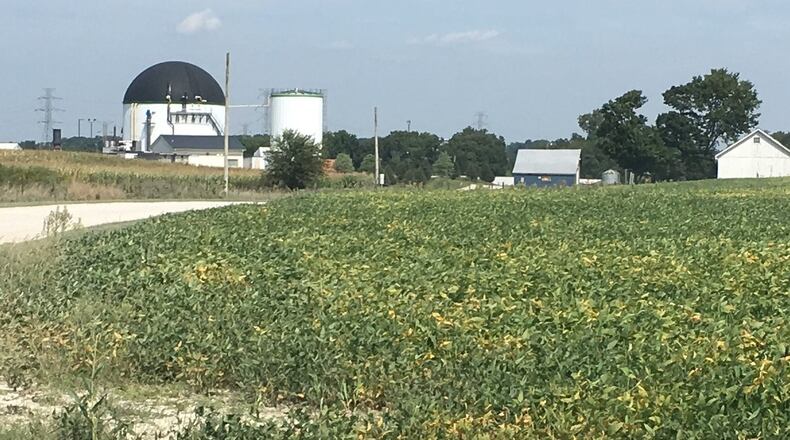“The out-of-town zoning inspector made a public report indicating we believe their property on Herr Road, owned by a township trustee, is in violation of the current zoning code,” Weade said.
RELATED: Dovetail Energy seeks EPA permit to add ponds to Bath Twp. operation
Dovetail Energy leases the Herr Road property from the owner, Bath Twp. Trustee Tom Pitstick. The company turns sewage and biowaste from municipalities and other sources into methane energy, the byproduct of which is then turned into fertilizer for crops used to feed livestock.
Neighbors complained about foul odors emanating from the farm as well as increased truck traffic since the company began operations in 2013, according to the report filed by the independent zoning inspector Jacob Barnes.
Barnes’ report indicates to qualify as agricultural, the bio-energy company needs to get 50 percent of its raw material from the farm itself, such as hog manure.
“The use of this property at the present time appears to be more industrial in nature as opposed to agricultural,” Barnes’ report reads. “It appears that … far more than 50% of the feedstock is derived from other sources, and is being brought to this site for disposal into this digester.”
Barnes further reported that if the facility was operating with at least 50 percent of the feedstock coming from the farm, “the facility would not produce the quantity of energy needed to sustain operations.”
Greene County and other local governments have contracted to haul their sewage to the Dovetail facility.
The Dayton Daily News first reported about neighbors concerns over the Herr Road operation in February 2018, when residents Ron and Kassie Lester filed complaints with the EPA over odors and truck traffic and formerly challenged the property’s agricultural zoning designation.
The Lesters have been leading the fight against the Bath Twp. operation, and in July won a Greene County Board of Revisions appeal case, which removed the Pitstick property’s tax-exemption status under the Current Agricultural Use Value program. The Lesters also filed a complaint with the Ohio EPA saying the company’s proposed plans to build new holding ponds threaten the local water supply.
Lester, who is running as a trustee candidate in the November election, said the case is “a prime example of them not looking out for the area residents.”
“It just makes us wonder why it has taken us two years to get to this point,” Lester said. “Two years and thousands of dollars trying to get to this point when other zoning issues have been brought to the township and instantly resolved within a month or two.”
Kassie Lester said they are also filing a complaint with the Ohio Ethics Commission against Pitstick, who recused himself from a vote on the zoning issue, but attended the executive session prior to the vote.
Pitstick declined to comment on the specifics of the zoning case, but he did respond to the ethics allegation. Pitstick said he asked Special Prosecutor Weade whether there would be a conflict if he sat in on the executive session, to which he was told “no.”
STAY CONNECTED: Greene County News on Facebook
Dovetail Energy has a similar operation in Morrow County, Ohio and in 11 other locations across the state, according to the EPA.
Renergy officials released a statement Wednesday, stating their legal team is reviewing the case, but they are “disappointed by the township’s decision and the possible negative impacts it could have on local small businesses and farmers.”
“Renergy is building a business that helps reduce the amount of waste in our landfills and reduce greenhouse gases, while creating clean energy and agricultural benefit in the process,” the statement reads. “100 percent of what is produced in our on-farm digester is used as fertilizer for Ohio farmland. In addition, our facility generates enough renewable electricity to provide all power needed to support all electricity needs of the farm where we operate.”
Renergy’s statement further reads: “We recognize these are complex issues, and we remain committed to working with our neighbors, local officials and state regulators to support more sustainable agricultural practices in Greene County.”
About the Author
